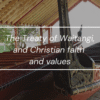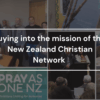It was good to read the following report from the Global Christian Forum about a significant gathering of Latin American Pentecostal leaders to discuss the issue of Christian Unity. There are clearly some parallels with the New Zealand scene although the small size of our country and our particular history, mean that there are inevitably differences also.
NZ Pentecostal leaders and others might appreciate the chance to use the full report in the following link or the summary below as a starting point in their own reflections on Christian unity.
NZ Christian Network is connected with the Global Christian Forum through our membership of the WEA (World Evangelical Alliance). NZCN national director Glyn Carpenter was one of the official WEA representatives at the 2nd Global Forum held in 2011.
Read the report in the GCF newsletter
Summary
Ipiranga Statement, São Paolo 2015
A group of Latin American Pentecostal leaders – pastors (men and women) of different Pentecostal churches of Brazil, young people, women and scholars of Pentecostalism in Latin America – met from 27 to 29 May 2015 in Ipiranga, São Paolo, Brazil. The meeting was held at the initiative of the Pentecostal Forum of Latin America and the Caribbean (FPLC), under the auspices of the Global Christian Forum and some Brazilian Pentecostal denominations. The theme of the meeting was Pentecostalism and Christian Unity: Institutional, Theological and Social Challenges.
Based on the presentations and the discussions, the forum affirmed the following:
On institutional challenges:
- To oppose the tendency in religious institutions to concentrate on self-preservation which leads them to be held back (closed) by their own limitations;
- To rethink the relationships of power and hierarchical ecclesial structures, and move towards greater participation in church decision making;
- To take positions on contemporary issues, such as gender, ethnic and racial questions;
- To invest in leadership formation of new generations to effect change – going beyond ‘apparent reforms’ and investing more in the cooperation with other churches.
On theological challenges:
- To develop a Pentecostal theology that values the hallmarks of Pentecostal experience and is able to be in dialogue with other schools of thought;
- To bring advances in academic theological insights closer to the life of the churches;
- To foster Latin American theological publication and production initiatives;
- To promote the sense of belonging of the Pentecostal churches to the fellowship of Christians around the world.
On social challenges:
- To see Pentecostals as a part of society who have their peculiar demands like any other group, which need to be understood and discussed in the wider society;
- To search for theoretical frameworks which awaken the social responsibility of Pentecostals in different contexts;
- To create opportunities for dialogue with other social movements on questions of gender, youth, poverty, violence, politics, corruption, public health etc.;
- To open up new spaces for youth and women in the church, building communities of faith based upon participation and openness to the society, and so able to hear the voices of our time and to contribute to the formation of citizenship.
Ipiranga, São Paolo (Brazil), 29th May 2015









0 Comments